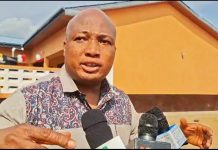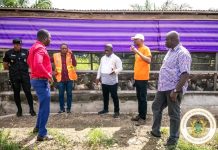The chiefs and people of Dagbamate in the Akatsi South Municipality have celebrated their annual Afetorku Traditional Religious Festival as part of activities to mark the Easter Season, where the occasion was used to commission a semi-detach two-bedroom residential accommodation for nurses.
This year’s Afetorku Festival was a unique occasion, because, for the past two years, when the Covid-19 pandemic became a major health challenge, followed by the health restrictions that led to the observation of protocols, including a total ban on public activities, including festivals, the celebration came to a halt.
The lifting of the restrictions, therefore, paved way for the celebration of the popular Afetorku Traditional Religion, when thousands of believers thronged the Dagbamate community, including people from the diaspora.
The Paramount Chief of Atsiame Traditional Area, Torgbui Samlafo IV, who addressed the large crowd, said culture and traditional values should be seen as one of the greatest assets for national cohesion and development, therefore, Ghanaians should value and protect the rich culture of the country.
Torgbui Samlafo noted that it was unfortunate that governments have set aside particular days to celebrate Christians and Islamic religious practices, and granted them recognition with public holidays and left out the Traditional Religion, which he described as the oldest religion that served as the foundation upon which society was built.
He, therefore, appealed to the government, as a matter of importance, to set aside a day to celebrate Traditional Religious Practice in the country, to help ensure that Ghanaians would value their culture and traditions.
The Chief of Dagbmate, Torgbui Klu Agudzeamegah II, observed that tradition religious practice was misunderstood by many to mean an evil practice, which was far from that, and called for education on traditional religion for all to appreciate and practice to help promote peace and unity.
Torgbui Klu Agudzeamegah said the Afetorku Traditional Religious Festival had been a source of inspiration to the citizens and a major social tool for mobilising the people for development, because funds raised at the festival were used to provide the development needs of the people.
He mentioned that the provision of educational infrastructure for schools, health facilities, potable water and electricity were all provided by the people, and stressed the importance of traditional religious practice in national development, and reiterated calls for government to set a day aside to celebrate traditional religion in the country.
The Chief of Dagbamate said, even though the people were able to provide most of their needs, it was important to note that it was not all of the needs that they could provide for themselves, because the people could not embark on projects like road construction, and appealed to government to construct the road from Dahgbamate to Akatsi to facilitate easy movement of goods and services.
The Chief Priest of Afetorku Shrine of Dagbamate, Hunoa Moses Davor, said the five cardinal principles of the Afetorku Shrine were truth, good neighbourliness, respect for human life, love and friendliness, and justice, which, he further said, made believers of the Afetorku Traditional Religious faithful special in society.
From Samuel Agbewode, Ho









